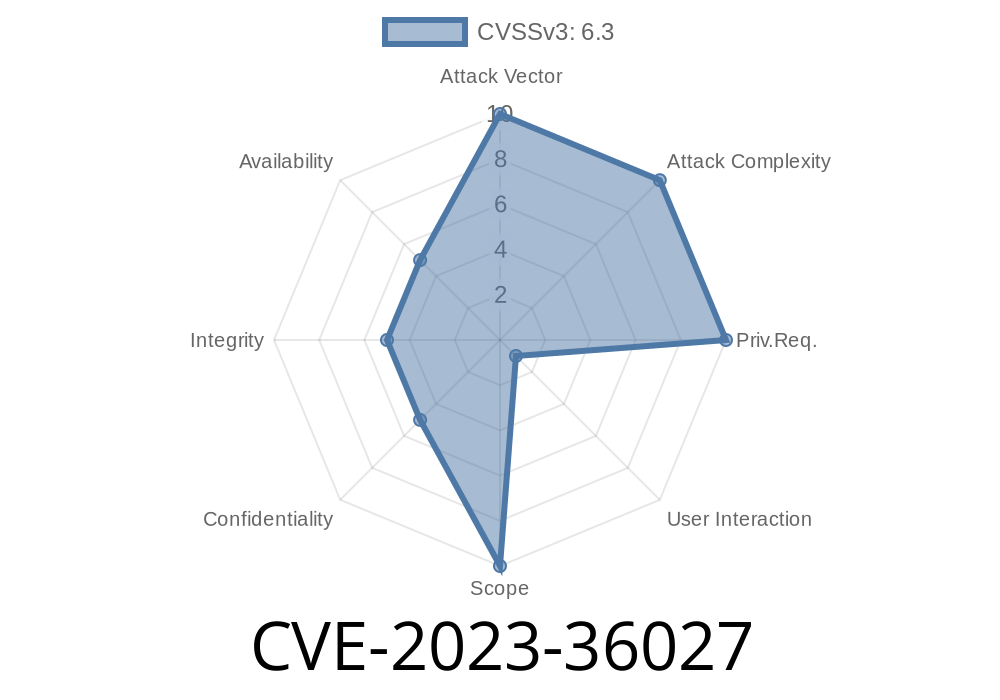---
When it comes to web security, browser vulnerabilities are among the most critical, since the browser is a gatekeeper between you and the internet. In November 2023, Microsoft disclosed CVE-2023-36027, an Elevation of Privilege (EoP) vulnerability affecting Microsoft Edge (Chromium-based). This post breaks down what CVE-2023-36027 is, how it works, and what you can do to protect yourself. We’ll also provide some exclusive insight, a code sample illustrating the pitfall, and links for deeper reading.
What is CVE-2023-36027?
CVE-2023-36027 is an Elevation of Privilege vulnerability reported in Microsoft Edge (the Chromium-based version). In layman’s terms, this means that a hacker could exploit this bug to gain higher-level permissions than they’re supposed to have — potentially seizing control of your browser, gaining access to sensitive data, or launching further attacks.
Microsoft’s advisory describes the flaw as impacting Edge's way of handling objects in memory. If successfully exploited, an attacker could execute code with the privileges of the user running Edge. If you're using an account with administrative privileges, the impact can be even worse.
Official reference:
- Microsoft CVE-2023-36027 Security Update Guide
- NVD Entry for CVE-2023-36027
How Does the Exploit Work?
Chromium (the underlying engine for Edge) is complex, processing a lot of objects and memory. This vulnerability stems from improper validation and use of privilege boundaries when certain JavaScript APIs or web-rendering operations are performed. An attacker could create a specially crafted website (or inject malicious payloads into a trusted site, using Cross-Site Scripting or other means) to trigger the vulnerability.
Victim visits a malicious site.
2. Crafted JavaScript manipulates browser objects in a way that forces Edge to treat low-privileged actions as high-privileged ones.
3. The attacker might run code in the user’s browser context, gaining access to files, cookies, or even launching further attacks within the local system.
Example: Simplified Exploit Code
Below is a *hypothetical simplified* JavaScript code that demonstrates a memory manipulation pattern often found with such vulnerabilities. (Note: This code won’t actually exploit CVE-2023-36027, but shows how attackers often work.)
// Hypothetical sample: Tricking Edge into exposing privileged actions
function escalatePrivileges() {
// Force browser to allocate and free memory objects rapidly
let arr = [];
for (let i = ; i < 10000; i++) {
arr.push(new Array(100000).fill('A'));
}
// Overwrite function pointer by abusing object reuse (simulated)
arr[500].__proto__.dangerousFn = function() {
// Malicious code executed with escalated privileges
// In real-world: Access files, cookies, or run commands
alert("Privilege escalated! (conceptual demo)");
};
// Trigger the exploit
arr[500].dangerousFn();
}
escalatePrivileges();
This conceptual code mimics what a real attack might do: heap spraying, memory corruption, and triggering an overwritten handler.
Who’s Affected?
Anyone running unpatched versions of Microsoft Edge (Chromium-based) before late November 2023 is at risk. The vulnerability is especially dangerous for users with administrator rights or those who haven’t updated their browsers.
How Can You Protect Yourself?
- Update Microsoft Edge: Microsoft released a patch in November 2023. Make sure you’re running version greater than 119..2151.44.
Practice Least Privilege: Don’t run your browser as an administrator.
- Enable Automatic Updates: Let Edge update itself to get security fixes as soon as they’re available.
References & Further Reading
- Microsoft CVE-2023-36027 Security Update Guide
- NVD: CVE-2023-36027
- Chromium Security Overview
- Microsoft Edge Release Notes
Final Thoughts
Browser vulnerabilities like CVE-2023-36027 underline the importance of prompt software updates and good security habits. While this Elevation of Privilege bug required a complex knowledge of browser internals to exploit, it posed real risks to everyday users.
Action Steps:
Stay vigilant
Have questions or need a deeper technical dive? Drop them in the comments below.
Timeline
Published on: 11/10/2023 20:15:07 UTC
Last modified on: 11/16/2023 20:02:02 UTC
